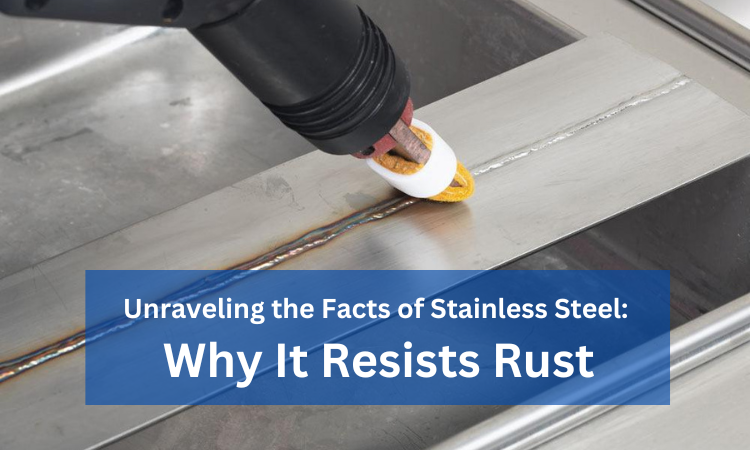Stainless steel is a top choice for many industries because it doesn’t rust or corrode, even when exposed to moisture, chemicals, or harsh weather. It’s great for outdoor use, and it’s ideal for products like kitchen appliances due to its outstanding resistance to rust and corrosion. This durability sets stainless steel apart in various industries.
In this blog section, we’ll dive into the corrosion resistance of stainless steel and explore its ability to prevent rust and corrosion. We’ll also delve into the causes of stainless steel rust and provide interesting facts and figures on the topic.
What is Stainless Steel?
Stainless steel is a metal made up of alloy materials that are together composed to obtain a mixture of iron with the addition of chromium and, in some cases, other elements like nickel and carbon, or bronze. The amount of carbon in stainless steel affects its resistance to corrosion. More carbon can increase the risk of corrosion.
Stainless steel isn’t made from just one material; it’s a group of alloys, each with unique properties and corrosion resistance. Stainless steel stays corrosion-resistant even when exposed to high temperatures. This quality makes it ideal for things like exhaust systems and important industries.
Types of Stainless Steel
There are various types of grades in stainless steel. Each end of every single grade has its own combination of alloy elements and metals, which specify their corrosion ability. Choosing the right grade of stainless steel is crucial for its performance in a specific application. Below, the primary and most preferred stainless steel grades are listed.
- Stainless steel, 304
- Stainless steel, 304L (low carbon)
- Stainless steel, 316
- Stainless steel, 316L (low carbon)
Types of Rusting or Corrosion:
Rust is a specific form of corrosion that affects iron and steel when they come into contact with oxygen and water. These are some of the types of rust mentioned:
- Crevice Corrosion: This type of corrosion can occur in spaces or gaps where the passive layer of stainless steel is compromised, and it’s a common issue with stainless steel in certain environments.
- Galvanic corrosion: This type of rusting takes place when two different metals come into direct contact in the presence of an electrolyte. Proper material selection is crucial to preventing it.
- Iron oxide corrosion: Iron oxide is the reddish-brown compound formed when iron or steel rusts, causing deterioration of the material.
- Pitting corrosion: It’s like stainless steel’s secret Achilles’ heel, where tiny holes can sneakily weaken its strength in tough environments.
- Carbon Steel Corrosion: Unlike stainless steel’s resilience, carbon steel readily succumbs to rust and corrosion, rendering it unfit for numerous applications. Here, high carbon can cause rust in comparison to low carbon. Hence, it is specified that low-carbon stainless steel is more suitable for the projects.
How Do You Prevent Stainless Steel from Rusting?
There are various types of corrosion that can easily affect stainless steel. Preventing stainless steel from rusting involves various procedures and excessive care for the metal. Some of the tips to prevent corrosion are given here:
Regular cleaning:
- Stainless steel should be regularly cleaned to remove contaminants like dirt and dust that can trap moisture and promote corrosion.
- Use mild soapy water or a stainless steel cleaner and a soft cloth or sponge for cleaning.
- Avoid abrasive cleaners, scouring pads, or steel wool, as they can scratch the surface and compromise its corrosion resistance.
- After cleaning, rinse the stainless steel product with clean water and wipe dry with a clean, dry cloth to prevent water spots.
Less exposure to corrosive substances:
- Stainless steel can get a coat of rust and corrosion when exposed to certain corrosive substances. These can include salt, chlorides, acids, which are commonly found in seawater and some cleaning products, and other harmful chemicals.
- To prevent exposure, be cautious when choosing the location and application of stainless steel.
- In harsh environments, consider protective measures or barriers to shield it from direct contact with corrosive agents.
Choose the right grade of stainless steel.
- When selecting the ideal grade of stainless steel, the specific environment and conditions in which it will be used should be taken into consideration.
- Common stainless steel grades used for corrosion resistance include 304 (suitable for general applications), 316 (highly resistant to chloride exposure, suitable for marine and coastal environments), and 316L (a low-carbon version of 316 for improved weldability).
- Consult with a materials expert or engineer to determine the best grade for your specific application.
Therefore, rust prevention strategies include regular cleaning, surface passivation, and avoiding exposure to corrosive agents. By following these rust prevention strategies, you can extend the lifespan and maintain the aesthetic appearance of stainless steel in various applications, from household appliances to industrial equipment and architectural structures.
Does stainless steel rust with water?
The stainless steel is primarily water-resistant; exposure to pure water won’t easily damage it. However, in some situations, if the stainless steel is exposed to warm water, the chances and circumstances of rusting with water increase. Warm water can form a direct reaction between the stainless steel and other alloy metals, which leads to corrosion.
How fast does stainless steel rust?
The speed at which stainless steel rusts varies depending on the factors mentioned above. Rust is usually a slow process, but in tough conditions, it can speed up. When stainless steel meets harsh weather, like rain, hail, or warm water, it might rust due to various factors.
Does stainless steel tarnish?
While tarnishing is different from rusting, stainless steel can develop discoloration or staining over time due to exposure to certain chemicals or conditions. Proper maintenance can prevent tarnishing.
Does stainless steel rust near the ocean?
Stainless steel has long been a popular choice for marine applications because of its corrosion resistance and low carbon quality. However, the specific grade and maintenance are crucial factors for long-term durability near the ocean.
Why does stainless steel not rust?
Stainless steel doesn’t rust because it forms a protective layer of chromium oxide. This shield keeps it corrosion-resistant. Compared to regular iron, stainless steel rusts much slower, especially when it has a low carbon content.
Does stainless steel rust faster than iron?
Iron rusts faster than stainless steel because stainless steel has a protective layer. Stainless steel contains iron and carbon, and low-carbon stainless steel is highly resistant to rust, making it a durable choice.
What steel is rust-proof?
As stated previously in the blog, stainless steel is a combined mixture of iron and carbon. And the use of low carbon makes the stainless steel corrosion-resistant. Hence, stainless steel is not properly rust-proof, but the chances of rusting are less in the case of stainless steel in comparison to iron.
Is rust on stainless steel permanent?
The rust on the stainless steel is not permanent. There are several ways to remove rust from stainless steel products. You can use household methods for removing the rust, like baking soda, vinegar, washing soda, or other acidic elements, which are helpful for removing the stains and corrosion on products of stainless steel like stainless steel welded mesh, wire mesh, and many more.
Corrosion resistance is a critical property of materials like stainless steel, ensuring their longevity and reliability. The resistance of stainless steel to rust and corrosion is remarkable because it has made it a highly demanded metal in various industries and in everyday applications. Understanding the factors that can compromise its corrosion resistance and taking appropriate preventive measures can help ensure the longevity and performance of products like stainless steel wire mesh, stainless steel welded mesh, and many more. Whether near the ocean, in water, even in high-temperature environments, or under other challenging conditions, the right choice of stainless steel grade and proper maintenance can keep rusting and corrosion at bay, allowing this versatile material to shine.
High-quality stainless steel manufacturer and supplier in the UAE
Are you looking for reliable stainless steel solutions? At SRK Metals, find customized solutions to your personal queries. Our extensive product range guarantees that you will receive the ideal stainless steel solutions for your unique requirements by providing a multitude of materials, sizes, and customization choices. From understanding your unique requirements to offering expert guidance, our unwavering focus is on ensuring that your stainless steel products not only meet but exceed your project’s objectives. As a well-established and highly regarded manufacturer and supplier, we specialize in delivering top-tier stainless steel wire, wire/woven mesh, welded mesh, chain-link fences, and a wide range of custom stainless steel solutions.
Why delay your project’s success any further? Let’s simplify your stainless steel needs and make your project truly stand out. Contact SRK Metal today. We are an established supplier of stainless steel products in Dubai, Sharjah, Abu Dhabi, Fujairah, and across the UAE. Explore the high-quality stainless steel solutions and enhance your projects with strength, durability, and aesthetic appeal. Make the smart choice with SRK Metal.

